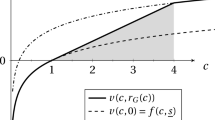Abstract
Risks are ubiquitous in many social dilemmas. A decision to cooperate (or invest in a common pool) is inherently “risky” when the reward received depends on the frequency of actions displayed by other social group members. In this paper, we study the evolutionary dynamics of the multiple-group public goods game where the population of mobile individuals is divided into fixed-sized groups. Agents use continuous investment strategies. This approach allows for the evolution of an intermediate level of investments correlated with specific risk aversion levels. Agents are also presented with an opportunity to switch groups at the end of each round based on an environmental trigger. Detailed simulation experiments using an evolutionary game theory framework show that investment levels can be maintained within groups. Over time, the mean level of the risk aversion trait increases especially for larger groups. In the conditional migration scenarios, levels of investment consistent with risk aversion emerge.
Access this chapter
Tax calculation will be finalised at checkout
Purchases are for personal use only
Preview
Unable to display preview. Download preview PDF.
Similar content being viewed by others
References
Bateson, M.: Recent advances in our understanding of risk-sensitive foraging preferences. Proceedings of the Nutrition Society 61(04), 509–516 (2002)
Bell, A.M.: Approaching the genomics of risk-taking behavior. Advances in Genetics 68, 83–104 (2009)
Cantú-Paz, E.: A survey of parallel genetic algorithms. Calculateurs Parallèles, Réseaux et Systòmes Répartis 10(2), 141–171 (1998)
Chiong, R., Kirley, M.: Effects of iterated interactions in multiplayer spatial evolutionary games. IEEE Transactions on Evolutionary Computation 16(4), 537–555 (2012)
Chiong, R., Kirley, M.: A multi-agent based migration model for evolving cooperation in the spatial N-player snowdrift game. In: Boella, G., Elkind, E., Savarimuthu, B.T.R., Dignum, F., Purvis, M.K. (eds.) PRIMA 2013. LNCS, vol. 8291, pp. 70–84. Springer, Heidelberg (2013)
Cressman, R., Song, J.W., Zhang, B.Y., Tao, Y.: Cooperation and evolutionary dynamics in the public goods game with institutional incentives. Journal of Theoretical Biology 299, 144–151 (2012)
Doebeli, M., Dieckmann, U., Hordijk, L.: Adaptive dynamics of speciation: spatial structure. In: Adaptive Speciation, pp. 140–167 (2004)
Fu., F., Nowak, M.: Global migration can lead to stronger spatial selection than local migration. J. Stat. Phys. (3-4), 637–653 (2013)
Fu, F., Chen, X., Liu, L., Wang, L.: Social dilemmas in an online social network: the structure and evolution of cooperation. Physics Letters A 371(1-2), 58–64 (2007)
Hauert, C.: Cooperation, Collectives Formation and Specialization. Advances in Complex Systems 09(04), 315–335 (2006)
Helbing, D., Yu, W.: The outbreak of cooperation among success-driven individuals under noisy conditions. Proceedings of the National Academy of Sciences of the United States of America 106, 3680–3685 (2009)
Hintze, A., Olson, R.S., Adami, C., Hertwig, R.: Risk aversion as an evolutionary adaptation. arXiv preprint arXiv:1310.6338 (2013)
Janssen, M., Goldstone, R.: Dynamic-persistence of cooperation in public good games when group size is dynamic. Journal of Theoretical Biology 243(1), 134–142 (2006)
Jiang, L.L., Wang, W.X., Lai, Y.C., Wang, B.H.: Role of adaptive migration in promoting cooperation in spatial games. Physical Review E 81(3), 036108 (2010)
Kahneman, D., Tversky, A.: Prospect theory: An analysis of decision under risk. Econometrica: Journal of the Econometric Society, 263–291 (1979)
Kanagaretnam, K., Mestelman, S., Nainar, K., Shehata, M.: The impact of social value orientation and risk attitudes on trust and reciprocity. Journal of Economic Psychology 30(3), 368–380 (2009)
Killingback, T., Bieri, J., Flatt, T.: Evolution in group-structured populations can resolve the tragedy of the commons. Proceedings of the Biological Sciences / The Royal Society (1593), 1477–1481 (June)
Nowak, M.: Five rules for the evolution of cooperation. Science (5805), 1560–1563 (December)
Nowak, M.: Evolving cooperation. Journal of Theoretical Biology 299, 1–8 (2012)
Parks, C.D.: Risk preference as a predictor of cooperation in a social dilemma. In: Contemporary Psychological Research on Social Dilemmas, pp. 58–70 (2004)
Perc, M., Gómez-Gardeñes, J., Szolnoki, A., Floría, L.M., Moreno, Y.: Evolutionary dynamics of group interactions on structured populations: a review. Journal of The Royal Society Interface 10(80) (2013)
Sasaki, T., Okada, I., Unemi, T.: Probabilistic participation in public goods games. Proceedings of the Royal Society B: Biological Sciences 274(1625), 2639–2642 (2007)
Sella, G., Lachmann, M.: On the dynamic persistence of cooperation: How lower individual fitness induces higher survivability. Journal of Theoretical Biology 206(4), 465–485 (2000)
Stern, M.D.: Patrimony and the evolution of risk-taking. PloS One 5(7), e11656 (2010)
Szolnoki, A.: Promoting cooperation in social dilemmas via simple coevolutionary rules. The European Physical Journal B-Condensed Matter and Complex Systems 67(3), 337–344 (2009)
Van Assen, M., Snijders, C.: Effects of risk preferences in social dilemmas: a game-theoretical analysis and evidence from two experiments. In: Contemporary Psychological Research on Social Dilemmas, pp. 38–65 (2004)
West, S.A., Griffin, A.S., Gardner, A.: Social semantics: altruism, cooperation, mutualism, strong reciprocity and group selection. Journal of Evolutionary Biology 20(2), 415–432 (2007)
Yang, H.X., Wu, Z.X., Wang, B.H.: Role of aspiration-induced migration in cooperation. Physical Review E 81(6), 065101 (2010)
Author information
Authors and Affiliations
Editor information
Editors and Affiliations
Rights and permissions
Copyright information
© 2014 Springer International Publishing Switzerland
About this paper
Cite this paper
Kirley, M., von der Osten, F.B. (2014). Adaptive Risk Aversion in Social Dilemmas. In: Dick, G., et al. Simulated Evolution and Learning. SEAL 2014. Lecture Notes in Computer Science, vol 8886. Springer, Cham. https://doi.org/10.1007/978-3-319-13563-2_38
Download citation
DOI: https://doi.org/10.1007/978-3-319-13563-2_38
Publisher Name: Springer, Cham
Print ISBN: 978-3-319-13562-5
Online ISBN: 978-3-319-13563-2
eBook Packages: Computer ScienceComputer Science (R0)




